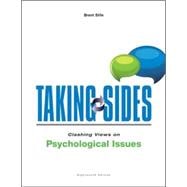
Contents TAKING SIDES: Clashing Views on Psychological Issues Seventeenth Edition, Expanded Unit 1 Biological Issues
Unit 2 Research Issues
Unit 3 Development Issues
Unit 4 Cognitive–Emotional Issues
Unit 5 Mental Health Issues
Unit 6 Psychotherapy Issues
Unit 7 Social Issues
|
The New copy of this book will include any supplemental materials advertised. Please check the title of the book to determine if it should include any access cards, study guides, lab manuals, CDs, etc.
The Used, Rental and eBook copies of this book are not guaranteed to include any supplemental materials. Typically, only the book itself is included. This is true even if the title states it includes any access cards, study guides, lab manuals, CDs, etc.